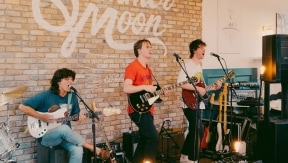
Why do we like the music we do?
Dozens of musical genres exist, there is one to suit every taste! But have you ever wondered why you happily tap your foot to jazz but change the music when techno comes on?
Science has discovered that the reason we like the music we do is as unique and surprising as the music genres themselves!
How does the brain transfer sounds?
To understand our musical tastes, we must first understand how sound is processed. The auditory cortex (the part of the brain that processes and stores basic sound information) communicates with the accumbens nucleus (the part of the brain considered to be the “reward circuit"). Simply put, our brains transfer incoming sounds and then categorizes them as pleasant or not.
But how does our brain determine which sounds are pleasant? It was believed that a person's tendencies to categorize one sound as pleasant over another was completely based on genetics. Science is showing that musical predilections are actually due to upbringing and culture.
The role of upbringing and culture
Our upbringing hugely influences our musical tastes. If heavy metal was played at dinner time throughout your childhood, it's likely that your tolerance level for heavy metal (and the rock genre as a whole) is higher than a person who was frequently accustomed to hearing opera.
Social circumstances factor in as well: gospel music is linked to church, dance music at a nightclub, and so on. If there was a propensity to frequent one more than another we may be inclined to prefer that genre over another.
It's worth noting that on a daily basis we are unknowingly exposed to music (while shopping, buskers in the street, at an airport, etc.) and this too can inadvertently shape our tastes.
Cultural behavioural studies support it. Researchers from MIT and Brandeis conducted a study that lends evidence to culture having more to do with musical taste than DNA. They surveyed inhabitants exposed to Western music (in the USA and in large Bolivian cities) and compared these results to those of a remote tribe in the Bolivian Amazonia that had no exposure to modern music. Researchers played a series of notes of consonant and dissonant sounds for the tribe members. While the dissonant sounds were considered unpleasant to those with access to Western music, of the 100 tribal members surveyed, there was little preference between the two sounds.
The results support the idea that our upbringing plays a larger role in our tastes than does our genetics.
Can we unlearn our musical tastes?
Over a period of 10 years, researchers at the University of Cambridge studied changing patterns in musical tastes. They concluded that there is a natural progression in tastes that changes with age.
Being open to new genres, exposing ourselves to them for a longer period of time can broaden our musical horizons... and even turn a jazz lover into a fan of techno.
Published on: September 1, 2017




